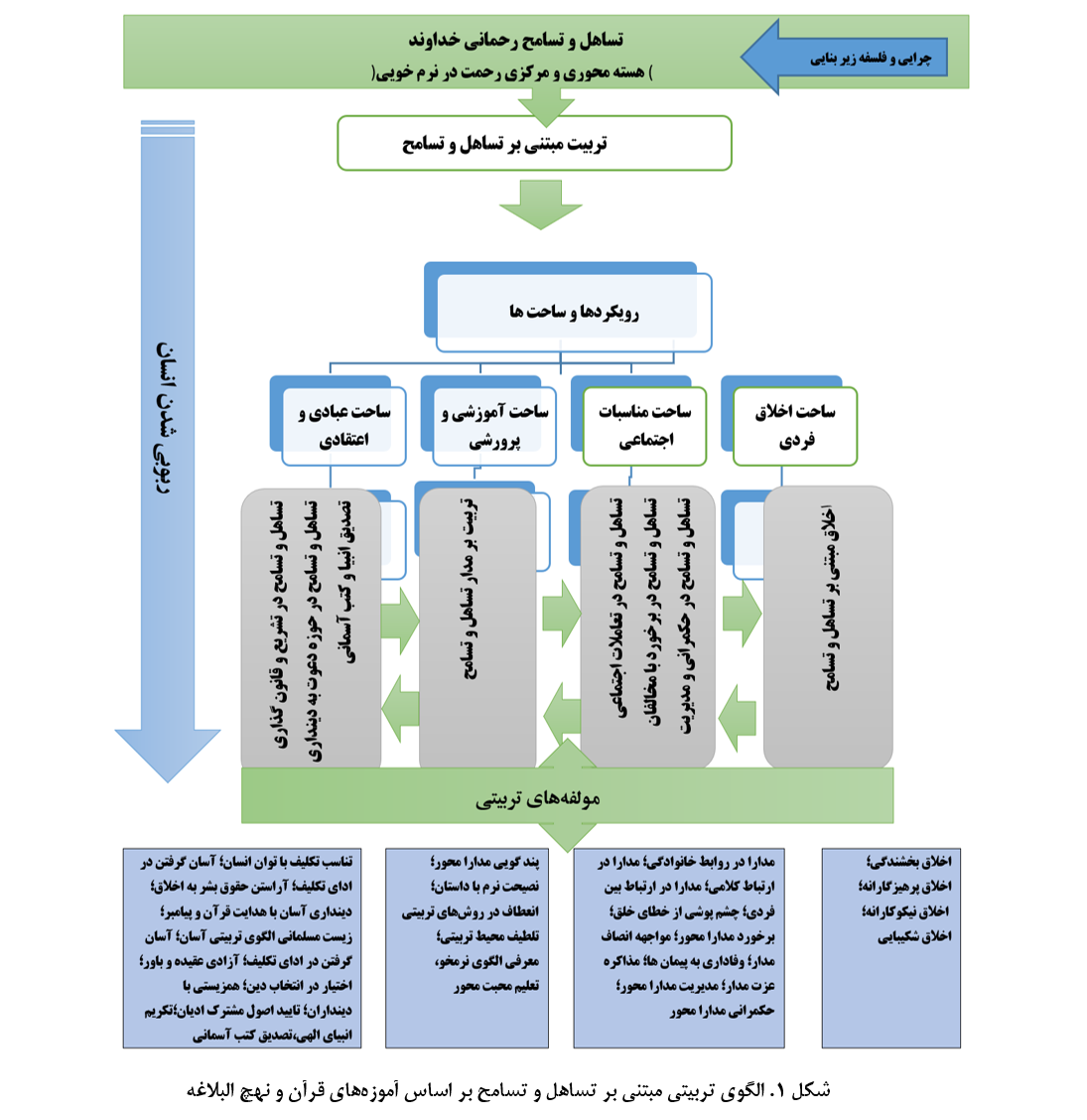The Educational and Developmental Realm in the Model of Tolerance and Forbearance Derived from the Quran and Nahj al-Balagha
Keywords:
Educational field, Holy Quran, Nahj al-Balagha Tolerance and ToleranceAbstract
This study aims to identify the educational and developmental realm and determine its educational components based on the model of tolerance and forbearance derived from the Quran and Nahj al-Balagha. The study was conducted using a qualitative approach, employing the grounded theory methodology for model design. The research domain included all verses of the Quran and sections of Nahj al-Balagha, including letters, sermons, proverbs, and more. The analysis of the research domain was carried out gradually based on keywords and recurring words related to the topic, with a focus on appropriate Persian and Arabic keywords such as tasāhul (tolerance), tasāmuh (forbearance), sahla (ease), samha (leniency), al-tasīr (facilitation), al-tasāhul (tolerance), al-suhūlah (simplicity), āsnī (ease), ‘afw (forgiveness), līn (gentleness), mudārā (tact), and soft-heartedness. This process continued until theoretical saturation was reached. For reviewing theoretical and research backgrounds, a library-based method and note-taking tool were employed, ensuring the fulfillment of alternative validity and reliability criteria based on trustworthiness, credibility, and dependability. Data analysis was conducted using the Glaserian method (open, selective, and theoretical coding). The findings presented the model of tolerance and forbearance in the educational and developmental realm, incorporating four educational domains: faith and worship, education and development, social relations, and individual ethics, all aimed at the nurturing and development of humanity. Based on the findings, the educational and developmental components of this model include: advice with a focus on tolerance, gentle counsel through storytelling, flexibility in educational methods, nurturing the educational environment, introducing a model of gentleness, and teaching with love. These components can serve as a new guide to transform schools into beloved places, fostering an atmosphere of affection.
Downloads
References
Ebadi SH, Keshtiaray N, Aghaei A, Yousefy A. Curricular Content for Pupils' Mental Health. International Education
Studies. 2016;9(12):137-47. doi: 10.5539/ies.v9n12p137.
Raghib Isfahani HiM. Al-Mufradat fi Gharib al-Quran. Tehran: Sadeq Publications; 2008.
Fiaaz A, Sharafi H. Perfectionism and its Relationship with Tolerance in Religious Education. Journal of Research on
Islamic Education. 2020;28(46).
Zobeidi M. Taj al-Arous min Jawahir al-Qamus. Beirut: Dar al-Hidaya; 1385.
Moein M. Moein Persian Dictionary. Tehran: Milad Publishing Institute; 2021.
Firozabadi MiYq. Al-Qamus al-Muhit. Beirut: Dar al-Kutub al-Ilmiyyah; 1995.
Faali MT. The Lifestyle of Imam Reza (A.S.) (1): Interpersonal Relations. Mashhad: International Cultural and Artistic
Foundation of Imam Reza (A.S.); 2015.
Farzaneh Poor H, Bakhshaei Zadeh M. Tolerance and Forbearance in the Quran. Scientific and Research Quarterly
Journal of New Religious Thoughts. 2011(25):157-69.
Nasiri B, Haji Ismaili MR. A Comparative Study of the Concepts of Tolerance in the Thoughts of John Locke and
Islamic Thought Based on the Quran. Religious Research Journal. 2023(44).
Mahroozadeh T, Iqbal Z. Tolerance and Compassion as a Criterion for Creating Islamic Civilization. Quranic and
Hadith Studies Journal. 2019;1(1).
Motamed Langroudi F, Rezaei R, Qassemnejad Z. Conceptualizing Tolerance in the Quran. Ahsan al-Hadith
Quarterly. 2017;2(4).
Shahandeh A, editor Tolerance and Compassion from the Perspectives of Islam and Liberalism. National Conference
on Tolerance and Compassion in Islamic and Iranian Culture; 2016.
Ahmad M, Ali Khoso A, Hammad Al Khadem M. Religious Tolerance and Its Importance in the Modern Times.
Research Journal of Islamic Culture and Civilization. 2022;3(1):24-33. doi: 10.53575/arjicc.v3.01(22)e3.24-33.
Kuzmenko R. Tolerance as the Basis of Education. Research Journal of Education, Psychology and Social Sciences.
;1(1):9-12.
Flick U. Introduction to Qualitative Research. Tehran: Ney Publications; 2024.
Fathi Vajargah K. Curriculum towards New Identities. Tehran: Ayij Publications; 2024.

Downloads
Published
Submitted
Revised
Accepted
Issue
Section
License
Copyright (c) 2024 Journal of Study and Innovation in Education and Development

This work is licensed under a Creative Commons Attribution-NonCommercial 4.0 International License.










